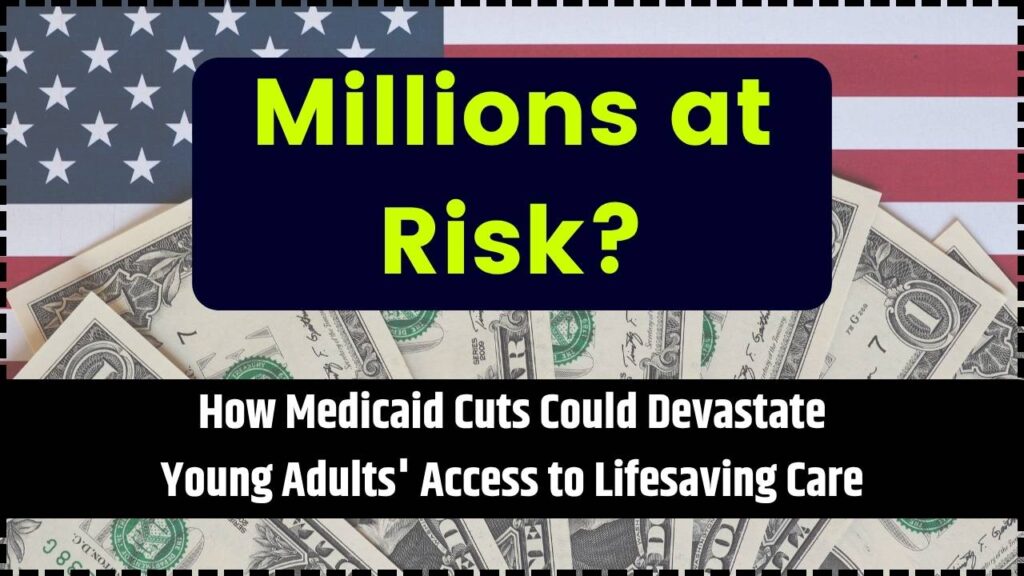Millions at Risk: The U.S. House of Representatives recently passed the “One Big Beautiful Bill Act,” a sweeping budget reconciliation package that includes $880 billion in Medicaid cuts over the next decade. These proposed changes could significantly impact healthcare access for young adults, particularly those aged 18 to 24, who rely on Medicaid for essential services. This article delves into the potential consequences of these cuts, providing context, practical advice, and clear examples to make the topic approachable for all readers.
Millions at Risk
The proposed Medicaid cuts present significant challenges for young adults across the United States. Increased work requirements and frequent eligibility checks could lead to widespread coverage losses, particularly affecting mental health and substance use disorder services. Staying informed, organized, and proactive is crucial to navigating these changes and maintaining access to essential healthcare services.

| Topic | Details |
|---|---|
| Proposed Medicaid Cuts | $880 billion over 10 years |
| Potential Coverage Loss | Up to 10.3 million people by 2034 |
| Affected Age Group | Young adults (18–24) |
| Work Requirements | 80 hours/month starting in 2026 |
| Mental Health Impact | Medicaid covers ~40% of adults with mental illness |
| Official Resources | Medicaid.gov |
Understanding the Proposed Changes With Millions at Risk
1. Increased Work Requirements
Starting in 2026, the bill mandates that able-bodied adults aged 19–64 must complete 80 hours of work, education, or community service per month to maintain Medicaid eligibility. While exemptions exist for certain groups, many young adults, especially students and caregivers, may struggle to meet these requirements.
2. Frequent Eligibility Checks
The legislation introduces biannual eligibility verifications, requiring beneficiaries to regularly confirm their income and residency status. This could lead to coverage lapses, particularly for young adults who frequently change jobs or residences.
3. Impact on Mental Health Services
Medicaid is the largest payer for mental health and substance use disorder services in the U.S., covering nearly 40% of adults with such conditions. The proposed cuts could dismantle critical support networks, leading to increased emergency room visits and societal costs.
Real-Life Implications
Case Study: Young Adults Facing Coverage Loss
Consider a 22-year-old college student working part-time to support themselves. Under the new requirements, they must document 80 hours of work or community service monthly. Balancing studies, work, and reporting obligations could become overwhelming, risking their Medicaid coverage.
Mental Health Access Challenges
A young adult managing depression relies on Medicaid for therapy sessions. With potential cuts and increased administrative hurdles, they might face delays or loss of access to essential mental health services, exacerbating their condition.
Practical Advice for Young Adults
- Stay Informed: Regularly check Medicaid.gov for updates on eligibility requirements and coverage changes.
- Document Everything: Keep records of work hours, community service, and any correspondence with Medicaid offices to ensure compliance with new reporting mandates.
- Seek Support: Utilize campus resources, community organizations, and healthcare providers to navigate changes and maintain access to necessary services.
Proposed Medicaid Changes Could Devastate Kentucky Families—See What’s at Stake
Retiring in These States? You’ll Need Over $1 Million Just to Cover the Basics
Federal Retirement Cuts Approved: What the House’s New Bill Means for Government Workers
Frequently Asked Questions (FAQs)
Q1: Who will be affected by the new work requirements?
A1: Able-bodied adults aged 19–64 without dependents will need to complete 80 hours of work, education, or community service monthly to retain Medicaid coverage.
Q2: Are there exemptions to the work requirements?
A2: Yes, exemptions include individuals who are pregnant, recently incarcerated, or have certain disabilities.
Q3: How can I prepare for the eligibility checks?
A3: Maintain up-to-date records of your income, residency, and any changes in employment or education status to ensure smooth verification processes.
Q4: What should I do if I lose Medicaid coverage?
A4: Explore alternative healthcare options through the Health Insurance Marketplace and seek assistance from local health departments or community organizations.











